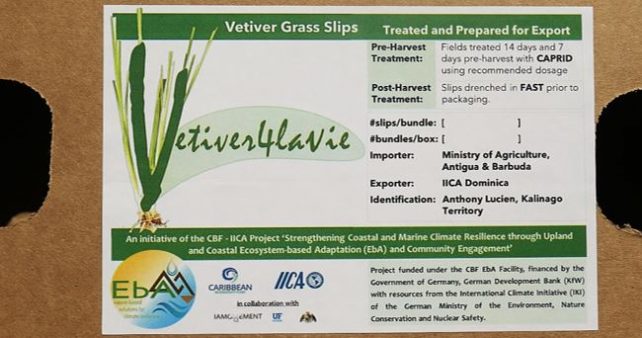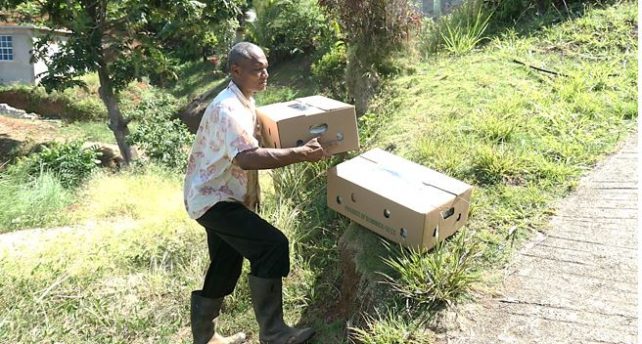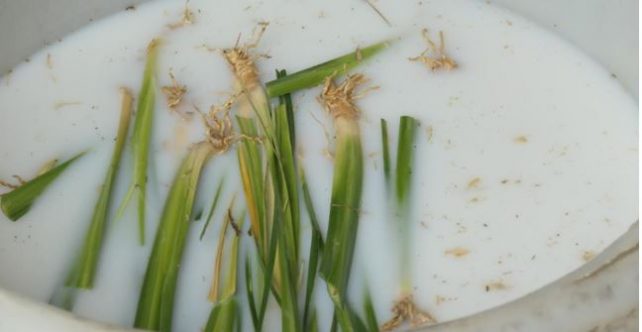
]IICA, the Caribbean Biodiversity Fund (CBF), IAMovement and University of Florida partner to bring grassroots solutions to the climate change challenge in vulnerable island communities.
The Inter-American Institute for Cooperation on Agriculture (IICA) and the Caribbean Biodiversity Fund (CBF) Ecosystem-based Adaptation (EbA) project hit a milestone with the first-time export of vetiver grass from Dominica to Antigua and Barbuda. The project “Strengthening Coastal and Marine Climate Resilience through Upland and Coastal Ecosystem Based Adaptation and Community Engagement”, is supporting climate change adaptation and poverty alleviation in Antigua and Barbuda, Dominica, Saint Lucia and Trinidad and Tobago. It is funded under the CBF EbA Facility, financed by the Government of Germany, German Development Bank (KfW) with resources from the International Climate Initiative (IKI) of the German Ministry of the Environment, Nature Conservation and Nuclear Safety.
Vetiver is seen as a green engineering solution to climate change. It is typical to Dominica, with farmers maintaining hedgerows in their fields, communities and around their homes to control water flow and soil erosion. One such farmer, Anthony Lucien of the Kalinago Territory sees vetiver as an inseparable part of Kalinago agriculture and culture. According to Lucien “we need to keep our culture alive and as a farmer, I am playing my part in growing the raw materials that my grandfather, father and people in my community still use to weave the baskets, mats and other crafts.” Selected to supply the vetiver grass slips to Antigua and Barbuda, he is proud to be part of this historical moment and project milestone.

Antigua and Barbuda have no significant sources of vetiver, hence the supply from Dominica. Under the project, the IICA Delegations and Ministries of Agriculture Plant Protection Units in Antigua and Barbuda, and Dominica coordinated a process to complete a Pest Risk Assessment (PRA), a first for the Region. Kent Coipel of IICA Dominica, coordinated the process of identifying and preparing the grass for export. The project provided Mr. Lucien with approved chemicals and safety wear for in-field treatment of plants and post-harvest treatment of clumps and slips, a first for Dominica.

In Dominica, the EbA project is being implemented in the rural areas of Petite Soufrière and Kalinago Territory, where the populations depend on coastal, marine and upland ecosystems for their livelihoods. These communities and their ecosystems are extremely vulnerable to climate change and adaption and as a consequence mainstreaming grassroots EbA solutions, will be important to building their environmental, economic and social resilience. This is in keeping with Dominica’s vision of becoming a resilient nation.
Coipel acknowledged the full and hands-on support of the MoA Dominica Plant Protection and Quarantine, and Extension Units in facilitating the Pest Risk Assessment, supervising in-field and post-harvest treatments, and clearing the packages for shipment on June 1st. This is the first batch of 2,180 vetiver grass slips of a total of 7,000 to be exported to Antigua under the project brand ‘Vetiver4lavie’ (i.e., vetiver for life). They will be received by the IICA Delegation and the MoA Antigua and Barbuda for propagation to supply the grass for green engineering soil and land amelioration/rehabilitation solutions in the Cooks Landfill and training of young persons in vetiver handicraft as viable green business livelihoods.

Stop being selfish and small minded. There is lots of vetivet growing all over Dominica and we are doing nothing with it. We already have an advantage in any industry. Just as we had a successful Windward Island Banana Industry we can have a Caribbean Vetivet Industry producing Vetivet Oils for the world market. It is this selfishness and narrow-mindedness that has prevented the Caribbean from developing as one region, rather than being dependent on passports as our main exports. Why can’t we work together to produce Caribbean brands to the world.
Reminds me of when dominican farmers sold plantain plants to guadeloupe and martinique. We all know what happened then. Sad
Reminds me of when dominica farmers sold plantain plants to guadeloupe and martinique. The rest is history. Sad
The question i ask is, what is Antigua going to do with it? whats crazy is all they spoke about here is “Strengthening Coastal and Marine Climate Resilience through Upland and Coastal Ecosystem Based Adaptation and Community Engagement”,
To my knowledge, vertiver is purchased in large amounts by perfume production companies. this link also provides a few other high value uses that Dominica can benefit from. https://www.healthline.com/health/vetiver-oil#uses-and-benefits . I guess all we can think about is exporting the raw plant to help with their coastal ecosystem. just like the rest of our produce. just sell in its saw state. Absolutely no value added. Awesome work guys! you continue to make me shake my head.